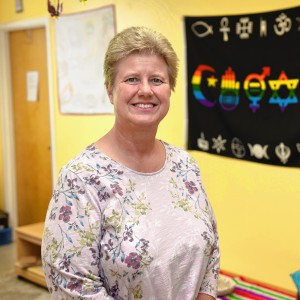(Doll)house hunter:Orange native makes business out of childhood passion
| Published: 08-08-2020 5:01 AM |
Are you searching for a furnished house with a tall painted fireplace? Or perhaps a beautiful Victorian with a vanity, hand-dressed metal bed and braided country-style rugs would suit your home needs?
Orange native Nathaniel Ellis wants to find you that dream house. But he’s not a real estate agent — he buys, restores and sells old and rare dollhouses.
“Imagination play isn’t as appreciated (today) as when I was little,” the 36-year-old said. “(I’m trying to) keep this hobby alive, at least in New England, and bring back an appreciation for handmade toys, nostalgia, imagination play.”
Ellis has lived in New Bedford for 13 years and owns Flip This Dollhouse, a toy shop/museum he operates out of the second floor of the Kilburn Mill at Clarks Cove at 127 West Rodney French Boulevard. He said the 5,000-square-foot former boxing gym holds one of the largest dollhouse collections in the world and he specializes in miniature interior design.
“There’s so much to look at, I don’t know why you’d look out the window, but it’s a beautiful view,” he said. He has been in the spot for about a year and a half.
Ellis sells dollhouses, dolls and accessories out of the shop and on Etsy, an online marketplace focused on handmade or vintage items and crafts. Flip This Dollhouse recently reopened after being forced to close due to Gov. Charlie Baker’s orders aimed at slowing the spread of COVID-19. Flip This Dollhouse has about 19,700 Facebook followers and roughly 1,880 “admirers” on Etsy, and Ellis said he is grateful to have loyal, dedicated customers who have helped keep him afloat in a tough industry throughout the pandemic. He noted that if you’re barely scraping by and trying to retain ownership of your actual house it can understandably seem a bit frivolous to buy a miniature house.
“It’s kind of an expensive hobby,” Ellis said, adding that running his 10-year-old business is “a struggle at times.”
He said his shop carries tens of thousands of items and its inventory is constantly changing. Ellis sells elaborate complete dollhouses and pre-design miniature rooms as well as individual accessories such as sofas, chairs, beds, rugs, dressers and lamps. He also sells mystery “grab bags” with randomly selected accessories.
Article continues after...
Yesterday's Most Read Articles
 Greenfield man arrested in New York on murder charge
Greenfield man arrested in New York on murder charge
 Man allegedly steals $100K worth of items from Northampton, South Deerfield businesses
Man allegedly steals $100K worth of items from Northampton, South Deerfield businesses
 Greenfield Police Logs: April 9 to April 17, 2024
Greenfield Police Logs: April 9 to April 17, 2024
 Former Leyden police chief Daniel Galvis charged with larceny
Former Leyden police chief Daniel Galvis charged with larceny
 Shea Theater mural artist chosen out of 354 applicants
Shea Theater mural artist chosen out of 354 applicants
 Millers Meadow idea would ‘completely transform’ Colrain Street lot in Greenfield
Millers Meadow idea would ‘completely transform’ Colrain Street lot in Greenfield
Ellis chose the business name because he considers himself a rescuer of rare dollhouses, buying and restoring them for collectors. He said he has dollhouses ranging from $50 to one with a $25,000 price tag. Most, he said, go for between $100 and $500. He has also started carrying dolls crafted by an artist in the United Kingdom.
Before his spot in the Kilburn Mill, Ellis rented space at the New Bedford Antique Center until it was converted into low-income apartments.
Ellis said his obsession with this niche hobby started when he was 7 years old and walked into an antique shop in downtown Orange and saw a gorgeous dollhouse with wallpaper, lighting, trim and flooring. He recalls opening the dollhouse’s front door and sticking his arm down the hallway and realizing it was like a real house, only miniature. Ellis said his parents would have allowed him to own a dollhouse as a child but the hobby was too expensive to justify when he was growing up. Instead, he improvised — making his own dollhouses out of cardboard boxes and cutting out doors and windows and poking tiny clear Christmas lights through for interior lighting. All the while, he dreamed of one day owning one of the dollhouses he regularly saw in catalogs.
His dream became a reality when he was 18 and he bought two dollhouses. He had more than 20 by the time he was 25 and 30 by 30 before his collection exploded in size.
Ellis graduated from Ralph C. Mahar Regional School and transferred from Fitchburg State College to the University of Massachusetts Dartmouth, where he earned a bachelor’s degree in human resources and an associate’s in operations management. He stayed in Bristol County for the better employment opportunities. Ellis worked as a recruiter for corporate companies but the career didn’t agree with him.
“I didn’t like it. It wasn’t for me,” he said. “I don’t like the office world, the corporate world.”
Ellis now works in interior design and is working toward a certificate from Style Design College. He said he thinks his love of dollhouses and passion for design go hand in hand.
“It was really about the decorating, the design aspect of it,” he said of his introduction to the hobby. “I really do love old houses, too.”
The dollhouse was inducted into the National Toy Hall of Fame in 2011, accompanied by Hot Wheels and the blanket. They joined the likes of Mr. Potato Head, the hula hoop, the Etch A Sketch and others.
According to the hall of fame’s website, the first dollhouses were developed in the late 1500s to depict the belongings of wealthy Europeans. They were known as “baby houses” and consisted of cabinets divided into compartments to display miniature furniture and household accessories. But they were also exclusively for adults and for display purposes only. In fact, the German word “dockenhaus” meant “miniature house,” not “dollhouse,” according to “The Ultimate Dolls’ House Book” by Faith Eaton.
By the 17th and 18th centuries, however, German toymakers produced a variation of the baby house for children to furnish with little chairs and tables, beds and pallets, and tapestries and floor coverings, according to the hall of fame’s website. Dollhouses began to be offered more cheaply thanks to the 19th century’s mass-production methods and more children of the middle class began enjoying them.
The hall of fame states dollhouses help youngsters learn about interior design and household management.
“Small hands develop manual dexterity in placing furnishings in the tiny rooms just so. While playing with their dollhouses, children begin to discern architectural styles and furnishings of varying designs and functions,” according to its website. “Dollhouse play encourages kids to make up their own stories about families and activities as they move tiny figures from room to room and prepare the rooms for meals, clean-up, parties, bedtime, and other familiar routines.”
Ellis estimates he currently has roughly 80 dollhouses for sale at his shop and 100 on display. He explained the shop is divided into two rooms – one is a retail space, the other is a collection of dollhouses, with the ones on the left side being for sale and the ones on the right being a private collection he allows the public to admire.
He said his favorite aspect of the hobby is “the thrill of the hunt.” He buys dollhouses from people who have had them sitting in attics and basements for 20 or 30 years and he takes pride in being able to restore them to their former glory. He said his shop has had visitors from all over the United States and from Canada.
Ellis recalls being a little boy fascinated with dollhouses and worrying what his friends would think of it.
“It feels very full circle for me, because I probably would have had to hide it,” he said. “Now, I can’t imagine that. There’s no reason.”
However, he knows there are still boys who might feel embarrassed or ashamed to ask for a dollhouse. Part of his mission, he said, is help demolish the notion that dollhouse collection and recreation is purely feminine. He said it drives him bonkers when someone visits his shop and decides to buy a house for their son or grandson but asks if he carries any miniature fire stations or log cabins. Ellis believes the type of miniature shouldn’t matter. Besides, the hobby has largely fallen out of favor with children of any gender in the past couple of decades.
“Even little girls now, they want iPhones and iPads,” Ellis said.
He said there are also older female hobbyists who sometimes feel embarrassed not because any perceived femininity but because they are adults essentially playing with toys. But dollhouses, Ellis said, can be therapeutic to people. He said they allow for an escape into “this little world” where you can be artistic and create any narrative you please. He said he has been known to stay up until 3 a.m. working on a dollhouse.
Ellis also mentioned the media often portray dollhouses and their enthusiasts as strange.
“All it takes is one show or movie that doesn’t paint them in a creepy light and it would really help the hobby,” he said.
Flip This Dollhouse can also be found on Twitter.
Domenic Poli can be reached at dpoli@recorder.com.

 Speaking of Nature: Indulging in eye candy: Finally, after such a long wait, it’s beginning to look like spring is here
Speaking of Nature: Indulging in eye candy: Finally, after such a long wait, it’s beginning to look like spring is here Celebrating ‘Seasonings’: New book by veteran preacher and poet, Allen ‘Mick’ Comstock
Celebrating ‘Seasonings’: New book by veteran preacher and poet, Allen ‘Mick’ Comstock Faith Matters: How to still the muddy waters of overthinking: Clarity, peace and God can be found in the quiet spaces
Faith Matters: How to still the muddy waters of overthinking: Clarity, peace and God can be found in the quiet spaces A time for every purpose under heaven: Free sing-a-long Pete Seeger Fest returns to Ashfield, April 6
A time for every purpose under heaven: Free sing-a-long Pete Seeger Fest returns to Ashfield, April 6
